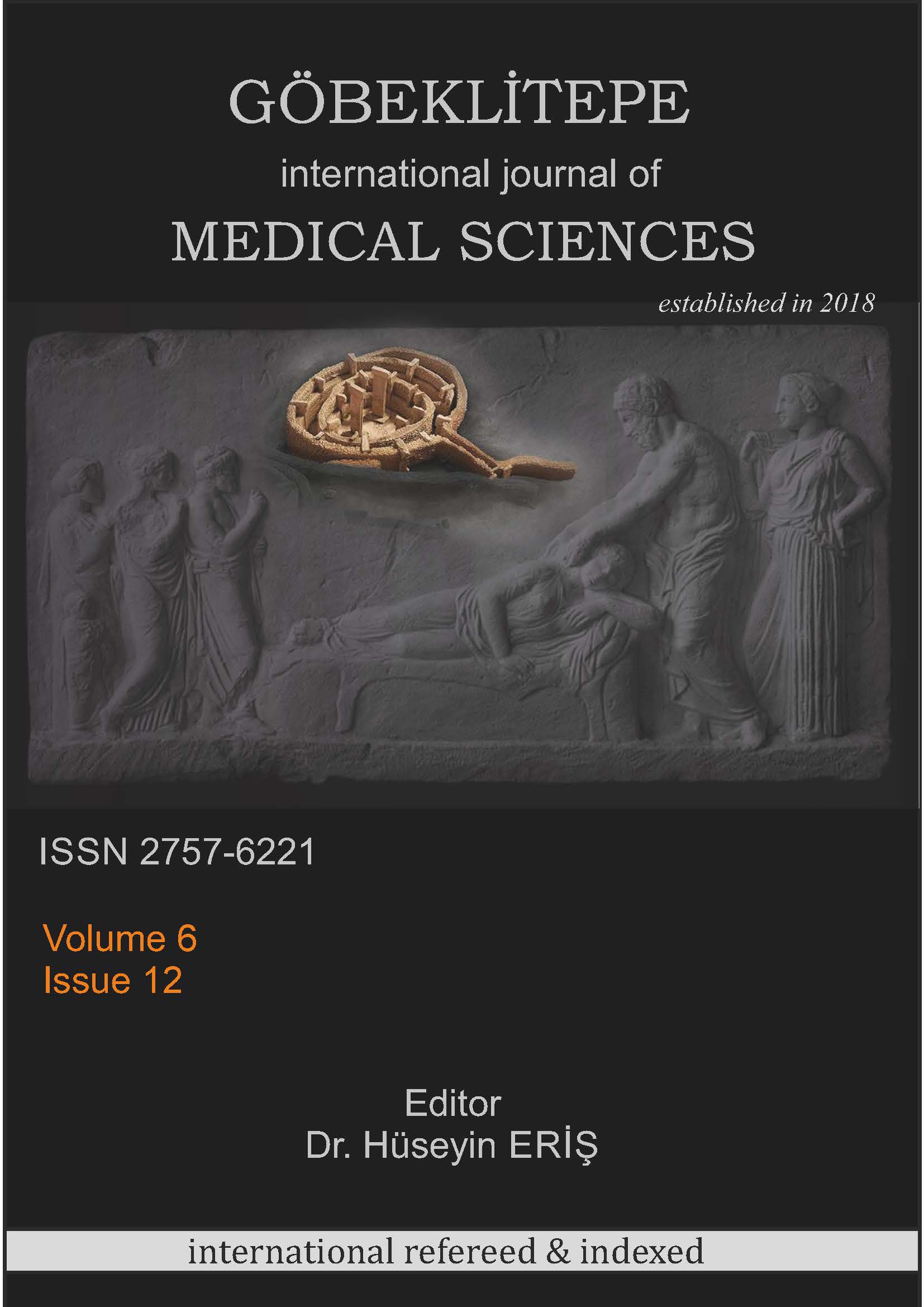KEMOTERAPİ ALAN KANSER HASTALARININ ALGILANAN STRES DÜZEYLERİ VE MİZAH YOLUYLA BAŞ ETME DURUMLARININ BELİRLENMESİ
Kanser Hastalarında Algılanan Stres Düzeyleri Ve Mizah Yoluyla Baş Etme
DOI:
https://doi.org/10.55433/gsbd/143Anahtar Kelimeler:
Kemoterapi, Stres, Mizah, Başa ÇıkmaÖzet
Bu çalışma, kemoterapi alan kanser hastalarında algılanan stres düzeyleri ve mizahla başa çıkma düzeylerini belirlemeyi amaçlamaktadır. Tanımlayıcı tipteki bu çalışma Türkiye'de tek bir merkezde gerçekleştirilmiş ve kanser tanısı almış toplam 135 hastayı içermektedir. Kemoterapi alan hastaların algılanan stres düzeylerinin yüksek olduğu ve mizahı stresli durumlar karşısında bir başa çıkma stratejisi olarak kullanım durumlarının ortalamanın altında olduğu görülmüştür. Algılanan stres ölçeği puanı ile yaş, çalışma durumu, kronik hastalık varlığı, kemoterapi alma sıklığı ve radyoterapi alma sıklığı arasında istatistiksel olarak anlamlı bir ilişki vardır (p<0.05). Mizah yoluyla başa çıkma ölçeği puanı ile yaş, eğitim, ekonomik durum, önceki hastaneye yatış ve tanıdan itibaren geçen süre arasında istatistiksel olarak anlamlı bir ilişki vardır (p <0.05). Kanser tanısı alımından itibaren hastaların mizah konusunda farkındalıklarının artırılması ve mizahın kullanılması tedavi ve izlemi olumlu yönde etkileyebilir.
Referanslar
Smith, H.R. (2015). Depression in cancer patients: Pathogenesis, implications and treatment (Review). Oncology Letters, 9(4), 1509–1514. https://doi.org/10.3892/ol.2015.2944
Seiler, A., & Jenewein, J. (2019). Resilience in Cancer Patients. Frontiers in Psychiatry, 10, 208. https://doi.org/10.3389/fpsyt.2019.00208
Dunnill, C.J., Al-Tameemi, W., Collett, A., Haslam, I.S., & Georgopoulos, N.T. (2018). A Clinical and Biological Guide for Understanding Chemotherapy-Induced Alopecia and Its Prevention. The Oncologist, 23(1), 84–96. https://doi.org/10.1634/theoncologist.2017-0263
Hopman, P., & Rijken, M. (2015). Illness perceptions of cancer patients: relationships with illness characteristics and coping. Psycho-oncology, 24(1), 11–18. https://doi.org/10.1002/pon.3591
National Cancer Instıtute. Feelings and Cancer 2021. URL: https://www.cancer.gov/about-cancer/coping/feelings
Henneghan, A., Phillips, C., & Courtney, A. (2018). We are different: Young adult survivors' experience of breast cancer. The Breast Journal. 2018; 24(6): 1126–1128. https://doi.org/10.1111/tbj.13128
Satıcı, S.A., & Deniz, M.E. (2017). Humor coping and flourishing: ınvestigating the mediating role of resilience and optimism. Elementary Education Online, 16(3), 1343-1356. DOI: 10.17051/ilkonline.2017.330262
Pinna, M., Mahtani-Chuganiz, V., Sánchez Correas, M.Á., & Sanz Rubiales, A. (2018). Theuse of humor in palliativecare: A Systematic Literature Review. The American Journal of Hospice & Palliative Care, 35(10), 1342–1354. https://doi.org/10.1177/1049909118764414
Wilkins, J., & Eisenbraun, A.J. (2009). Humor theories and the physiological benefits of laughter. Holistic nursing practice, 23(6), 349–354. https://doi.org/10.1097/HNP.0b013e3181bf37ad
Samant, R., Balchin, K., Cisa-Paré, E., Renaud, J., Bunch, L., McNeil, A., Murray, S., & Meng, J. (2020). The importance of humour in oncology: a survey of patients undergoing radiotherapy. Current Oncology (Toronto, Ont.), 27(4), e350–e353. https://doi.org/10.3747/co.27.5875
Tanay, M.A., Roberts, J., & Ream, E. (2013). Humour in adult cancer care: a concept analysis. Journal of Advanced Nursing, 69(9), 2131–2140. https://doi.org/10.1111/jan.12059
Roaldsen, B.L., Sørlie, T., & Lorem, G.F. (2015). Cancer survivors' experiences of humour while navigating through challenging landscapes--a socio-narrative approach. Scandinavian Journal of Caring Sciences, 29(4), 724–733. https://doi.org/10.1111/scs.12203
Linge-Dahl, L.M., Heintz, S., Ruch, W., & Radbruch, L. (2018). Humor Assessment and Interventions in Palliative Care: A Systematic Review. Frontiers in Psychology, 9, 890. https://doi.org/10.3389/fpsyg.2018.00890
Dean, R.A, & Major, J. E. (2008). From critical care to comfort care: the sustaining value of humour. Journal of Clinical Nursing, 17(8), 1088–1095. https://doi.org/10.1111/j.1365-2702.2007.02090.x
Sousa, L., Marques-Vieira, C., Antunes, A.V., Frade, M., Severino, S., & Valentim, O.S. (2019). Humor intervention in the nurse-patient interaction. RevistaBrasileira de Enfermagem, 72(4),1078–1085. https://doi.org/10.1590/0034-7167-2018-0609
Kovarsky, D., Schiemer, C., & Murray, A. (2011). Humor, rapport, and uncomfortable moments in interactions with adults with traumatic brain injury. Topics in Language Disorders, 31, 325–335. doi:10.1097/TLD.0b013e3182358e98
Başkaya, E., & Demir, S. (2018). A Touch to life with magical smiles: Humor therapy. Journal of Health Science and Profession, 5(3), 453-457.doi: 10.17681/hsp.34028832
Erci, B. (2006). Reliability and validity of the Turkish version of the perceived stress scale. Journal of Anatolia Nursing and Health Sciences, 9(1), 58-63.
Buiting, H.M., de Bree, R., Brom, L., Mack, J.W., & van den Brekel, M.W. (2020). Humour and laughing in patients with prolonged incurable cancer: an ethnographic study in a comprehensive cancer centre. Quality of Life Research, 29(9), 2425-2434.
Cohen, S., Kamarck, T., & Mermelstein, R. (1983). A global measure of perceived stress. Journal of Health and Social Behavior, 24(4), 385–396.
Martin, R.A., & Lefcourt, H.M. (1983). Sense of humor as a moderator of the relation between stressors and moods. Journal of Personality and Social Psychology, 45(6), 1313–1324. https://doi.org/10.1037/0022-3514.45.6.1313
Martin, R.A. (1996). The Situational Humor Response Questionnaire (SHRQ) and the Coping Humor Scale (Chs): A Decade of Research Findings, Humor: International Journal of Humor Research, 9(3-4), 251-272.doi:
1515/humr.1996.9.3-4.251
Yerlikaya, E.E. (2009). The relationship between humor styles and perceived stress, anxiety and depression of college students, Çukurova University Social Sciences Institute, Adana.
Mazor, M., Paul, S.M., Chesney, M.A., Chen, L.M., Smoot, B., Topp, K., Conley, Y.P., Levine, J.D., & Miaskowski, C. (2019). Perceived stress is associated with a higher symptom burden in cancer survivors. Cancer, 125(24), 4509–4515. https://doi.org/10.1002/cncr.32477
Ramandeep, P.S. (2019). Effect of humour therapy on psychological health of cancer patients. International Journal of Practical Nursing, 7(1), 29-35.DOI: 10.21088/ijpn.2347.7083.7119.5
Alagizy, H.A., Soltan, M.R., Soliman, S.S., Hegazy, N.N., & Gohar, S.F. (2020). Anxiety, depression and perceived stress among breast cancer patients: single institute experience. Middle East Current Psychiatry, 27(1), 1-10.
Kikuchi, N., Nishiyama, T., Sawada, T., Wang, C., Lin, Y., Watanabe, Y., Tamakoshi, A., & Kikuchi, S. (2017). Perceived Stress and Colorectal Cancer Incidence: The Japan Collaborative Cohort Study. Scientific Reports, 7, 40363. https://doi.org/10.1038/srep40363
Li, J., Gao, W., Yang, Q., & Cao, F. (2021). Perceived stress, anxiety, and depression in treatment-naïve women with breast cancer: a case-control study. Psycho-Oncology, 30(2), 231–239. https://doi.org/10.1002/pon.5555
Jan, F., Singh, M., & Nisar, S. (2021). Perceived stress in cancer patients: An integrative review. Indian Journal of Psychiatric Nursing, 8(2), 112. https://doi.org/10.4103/iopn.iopn_4_21
Rose, S.L., Spencer, R.J., & Rausch, M.M. (2013). The use of humor in patients with recurrent ovarian cancer: a phenomenological study. International journal of gynecological cancer: official journal of the International Gynecological Cancer Society, 23(4), 775–779. https://doi.org/10.1097/IGC.0b013e31828addd5
Johnson, E.M., & Ross, D.B. (2021). The Cost of Cancer: The Association of Financial and Cancer-Related Stress on Maladaptive Coping Styles in Families with a Cancer Diagnosis. Contemporary Family Therapy, 1–10. Advance online publication. https://doi.org/10.1007/s10591-021-09595-5
Vancampfort, D., Koyanagi, A., Ward, P.B., Veronese, N., Carvalho, A.F., Solmi, M., Mugisha, J., Rosenbaum, S., De Hert, M., & Stubbs, B. (2017). Perceived Stress and Its Relationship with Chronic Medical Conditions and Multimorbidity Among 229,293 Community-Dwelling Adults in 44 Low- and Middle-Income Countries. American Journal of Epidemiology, 186(8), 979–989. https://doi.org/10.1093/aje/kwx159
Karamadi, M., & D Silva, C. (2020). Perceived Stress and Life Satisfaction among Adults with and without Chronic Illness. International Journal of Creative Research Thoughts (IJCRT), 8(3), 2848-2851.
Barre, P.V., Padmaja, G., Rana, S., & Tiamongla. (2018). Stress and quality of life in cancer patients: medical and psychological intervention. Indian Journal of Psychological Medicine, 40(3), 232-238.
Miceli, J., Geller, D., Tsung, A., Hecht, C. L., Wang, Y., Pathak, R., Cheng, H., Marsh, W., Antoni, M., Penedo, F., Burke, L., Ell, K., Shen, S., & Steel, J. (2019). Illness perceptions and perceived stress in patients with advanced gastrointestinal cancer. Psychooncology, 28(7), 1513-1519.
Richards, K., & Kruger, G. (2017). Humor styles as moderators in the relationship between perceived stress and physical health. Sage Open, 7(2), 1-8.https://doi.org/10.1177/2158244017711485
İndir
Yayınlanmış
Sürüm
- 2024-07-02 (2)
- 2023-06-27 (1)
Nasıl Atıf Yapılır
Sayı
Bölüm
Lisans
Telif Hakkı (c) 2023 Göbeklitepe Sağlık Bilimleri Dergisi

Bu çalışma Creative Commons Attribution 4.0 International License ile lisanslanmıştır.




